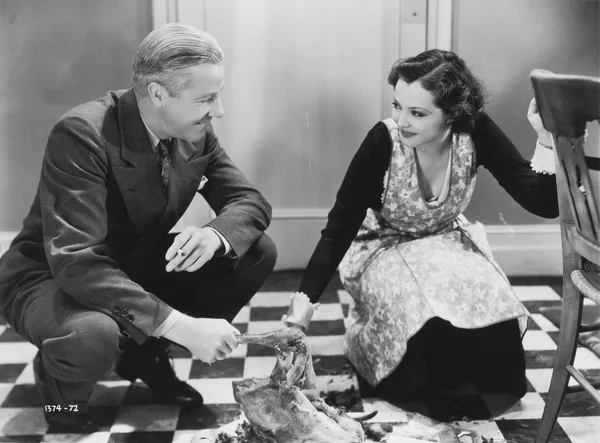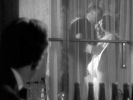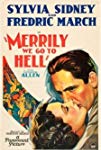Eye For Film >> Movies >> Merrily We Go To Hell (1932) Film Review
Merrily We Go To Hell
Reviewed by: Jennie Kermode

In what has been referred to as a post-truth era, public trust in journalists is low, but was it ever thus? If you want to find the people who trust a certain type of journalist the least, try talking to other members of their profession. Jerry (Frederic March, who also contributed the film’s title, may be no angel – he’s still a young reporter but the pile of beer bottles stacked around him are an indicator of the direction his life has been taking – yet when he sees his sleazy gossip columnist colleague hitting on a clearly unhappy young woman he is deeply unimpressed. Fortunately the young woman knows how to handle herself. When she stumbles out onto the balcony he has been sharing with the bottles, he promises to be better company. They talk - banter might be a better word, her wit easily a match for his. Then he impulsively kisses her and she impulsively invites him to afternoon tea.
This is Joan (Sylvia Sidney), a coffee heiress and teetotaller – not the kind of woman one might expect to stumble into the life of a man like Jerry, but opposites attract. Her father is worried y the situaation, not least because Jerry is late even for that first date, but he can see how deeply enamoured she is. George Irving presents us with a rare character to see onscreen in the period, a father who clearly dotes on his daughter and wants to support her decisions even though he feels she’s making a mistake. As a result, it’s easier even for young audience members to see his wisdom and wish that she would listen – but despite further humiliations she allows her hear to overrule her head, and soon wedding bells are chiming.

As a lesbian, director Dorothy Arzner enjoyed more freedom within the Hollywood milieu than you might expect but one thing she couldn’t do was marry, meaning that she came to this story with an outsider’s perspective and it’s that, perhaps, that makes her observations as sharp as they are. Though sympathetic to all its characters, this is a romcom in which the comedy frequently comes at the expense of the romance. it’s also one that dares to break with convention. The freshly wedded Jerry quickly moves on from newspaperman to failed playwright, but it’s when he has a hit (look out for a young Cary Grant as one of the players) that things really go awry. That’s because his ex, ambitious actress Clare (Adrianne Allen), suddenly decides she’s interested in him again, and sweet little Joan can’t compete with her experienced rival. So she stops being sweet, starts drinking, and tells Jerry that if he’s going to see other people, so is she.
Though it ultimately swings back around to a conventional ending (one that won’t really bring closure to viewers familiar with alcoholism), there’s a good deal that’s genuinely daring about this production, which was made after the introduction of the notorious Hays Code but before it was seriously enforced. Summing up the reason why he’s never been married before, Jerry declares “I figured out a long time ago that a punch in the nose heals much more quickly than a broken heart.” Arzner pokes fun at him, playing around with the physical comedy of a drunk man on a slippery marble floor, but the way she shoots him at his most inebriated also gives him a prettiness and sensuality rare in male characters in the post-silent period, emphasising that his physical vulnerability is part of what Joan finds attractive about him. It’s a device that puts the film’s heroine back in the driving seat and ensures that we don’t see her simply as a victim.
The production looks sumptuous, with elegant sets and exquisite fabrics signalling Joan’s social position. Though the set-up is often quite stagy – as was true of many films of the time – Arzner makes good use of space and the fluidity of character movement keeps it from looking too artificial. Edwin Justus Mayer’s screenplay is packed full of zingy one-liners but always puts character first. We can believe that Jerry and Joan really love each other. We can also believe that marrying one another was the last thing they needed.
Reviewed on: 02 Mar 2020
















